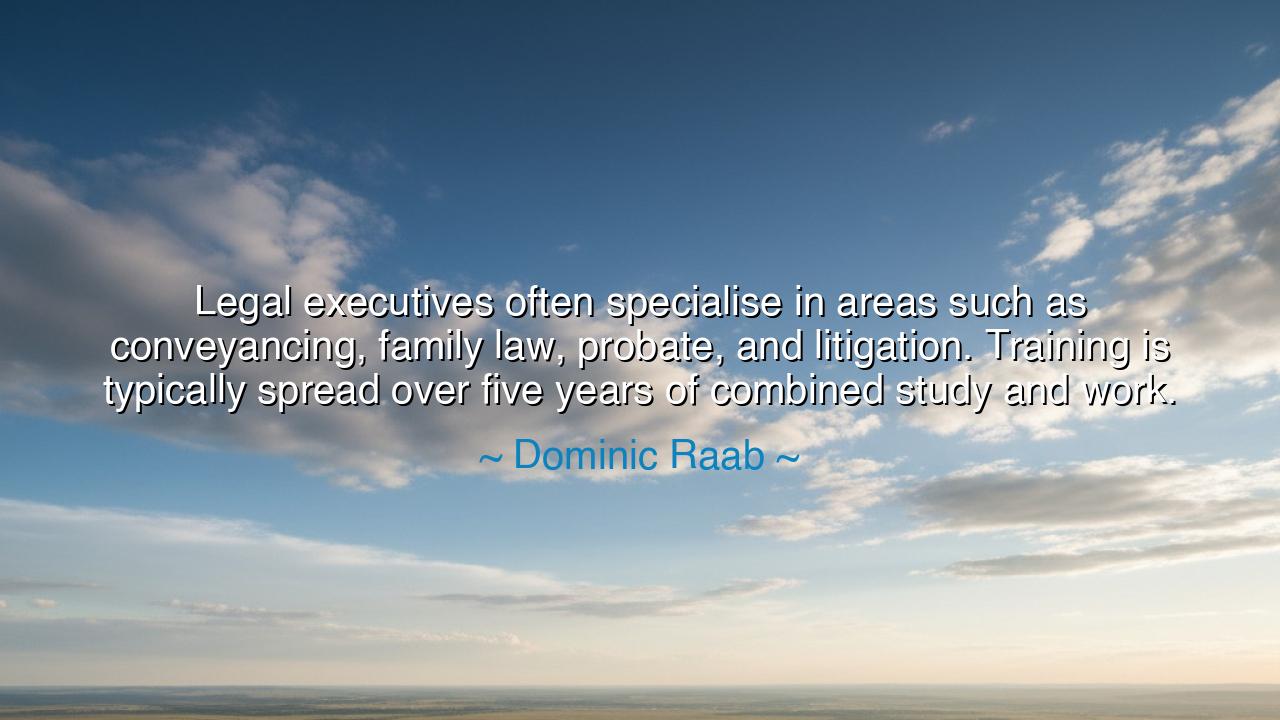
Legal executives often specialise in areas such as conveyancing
Legal executives often specialise in areas such as conveyancing, family law, probate, and litigation. Training is typically spread over five years of combined study and work.






When Dominic Raab declared, “Legal executives often specialise in areas such as conveyancing, family law, probate, and litigation. Training is typically spread over five years of combined study and work,” he spoke not merely of the structure of a profession, but of the discipline and devotion required to serve the law with wisdom and integrity. Beneath these practical words lies a deeper truth — that the pursuit of justice is not a sudden ascent, but a long, steady climb; a craft learned through years of patient labor, reflection, and sacrifice. In the simplicity of his statement is the echo of an eternal principle: that true mastery — whether of law, art, or life — can only be attained through perseverance and practice joined together in purpose.
The origin of this quote lies in Raab’s reflections on the British legal profession, particularly his respect for the Chartered Institute of Legal Executives (CILEX) — a body that allows individuals to become legal practitioners through gradual, work-based study rather than the traditional university path. In these words, he honors those who enter the profession not through privilege, but through diligence, those who learn the law not as an abstraction, but as a living force — felt in contracts signed, disputes settled, and families reconciled. His tone, though factual, carries an undertone of reverence: for those who give years of their life to learning how to balance the delicate scales of justice, ensuring that the law serves both the powerful and the humble alike.
To specialise — in conveyancing, family law, probate, or litigation — is more than to memorize procedures or statutes. It is to immerse oneself in the rhythms of human life. The conveyancer walks among dreams — the dreams of homes built and owned. The family lawyer navigates the storm of heartbreak and reconciliation. The probate specialist deals with grief, where the law must bring order to loss. And the litigator steps into the battlefield of conflict, wielding words as weapons and shields. Each specialization, as Raab suggests, is a fragment of humanity’s story told through the language of law. To study these things for five long years is to learn not only the rules of society, but the nature of mankind itself.
This devotion recalls the traditions of the ancient world. In the Roman Republic, the jurisconsults — the legal scholars and advocates of the time — spent years apprenticing under masters, learning not only the principles of Roman law but also the philosophy that sustained it. One did not become a jurist by decree, but by living among the cases, arguments, and judgments that defined civilization. The same spirit breathes through Raab’s words: the belief that the law, to be just, must be grounded in experience, and that wisdom comes only when knowledge meets life. The five years of combined study and work symbolize this union — intellect and practice joined in the service of order and truth.
Yet beyond technical mastery lies a moral lesson. Raab’s reflection reminds us that the law is not a cold machine — it is a living structure, built by human hands and guided by human hearts. Those who train within it must learn patience, humility, and empathy. The law is vast, and no one can command it in its entirety; one must therefore specialize, as he notes, in a fragment of it — and in that fragment, seek excellence. There is a quiet nobility in this path: to dedicate years to a single corner of justice, to labor unseen in the service of peace, and to ensure that every document, every verdict, and every judgment contributes to the stability of the world.
In this, there is also a mirror for all who walk the path of learning. The five years of study and work stand not only for legal education but for the rhythm of all great endeavors. The poet, the craftsman, the healer — each must apprentice, fail, and rise again before their work gains beauty and meaning. Impatience is the enemy of mastery. As the ancients taught, “The seed that breaks the earth too soon withers before the sun.” So too, the student of law — or of life — must endure the slow refining of effort and experience before they are ready to bear the mantle of responsibility.
Let this, then, be the lesson for all generations: that the pursuit of excellence is a long road, and that wisdom cannot be rushed. Discipline, study, and lived experience are the pillars upon which true understanding rests. Whether in law or in any field, greatness does not spring from ambition alone, but from endurance — the will to keep learning when others grow weary, and the humility to serve before one leads.
And so, in Dominic Raab’s simple observation, we find an ancient truth reborn: that to know the law is to know life, and to serve it well demands both intellect and toil. The legal executive, like the philosopher or the craftsman, is not made in a moment but forged across years of striving. The path is long, but in walking it with patience and devotion, one not only learns the law — one learns justice, and through justice, the higher art of being human.






AAdministratorAdministrator
Welcome, honored guests. Please leave a comment, we will respond soon